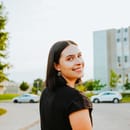Something that I have struggled my whole life with is how I look, and I know I’m not alone in that. Even when I was at the top of my game, in the best shape of my life (or so I thought), I would still have nagging thoughts in the back of my head saying, “oh my gosh, your thighs are so big,” or, “why are your shoulders so broad”––they were endless. So I worked harder and harder and harder. I thought that once I achieved my goal of playing my sport at the post-secondary level, all of those feelings would disappear because I had done it: I had accomplished one of my dreams. Well, they didn’t. They came back with a vengeance.
The entire time, I was so inside my head about my appearance that I didn’t enjoy it and I didn’t revel in my success. So again, I worked harder and harder and harder, until I ended up fracturing my hip. As an 18-year-old, when you tell people you broke your hip, they don’t believe you. But, I did, and that left me on crutches for I don’t even remember how long. As a result, I gained a lot of weight––and I was genuinely heartbroken. Everything I had worked for was kind of flushed down the toilet. I went from the top of my game to the heaviest I had ever been.
Going through the rehabbing process was tough for me. I didn’t like looking in the mirror because it made me loathe myself. By the end of the season, I made it back on the court; not at my best, but I was still able to play. I trained throughout the entire summer while working in order to prepare for the fall tryouts. I was cut; I didn’t make it. In that moment, my whole world collapsed. I don’t think I had ever been more disappointed in myself. For probably six months after I was cut from the team, I didn’t exercise, I ate whatever I wanted and I threw myself into school. I was unhappy and unhealthy. My sport was my entire identity for as long as I could remember and I didn’t know who I was without it.
I decided to ask my coach if I could come to practice as a volunteer. I just needed to still be involved. This sparked something in me and I slowly started exercising again. I started to feel more like myself. After stepping back into that gym, as nervous as I was, my confidence began to come back. I figured if I could face the shame I was feeling about being cut from the team head-on, then I could surely face my body insecurities too.
I was finally able to slow down and become more in tune with my body. I found it challenging that my body moved in a different way after my injury and I wasn’t even able to squat like I did in the past. I realized that in the same way I’d found my new role with the team, I needed to find a new way to exercise that worked for me. This was my new task, to work harder and harder and harder at. I needed to find my new thing, my new way to be me and to be a healthy me. Once I found my new exercise strategy, I thought a good next step would be to tackle my eating.
Not having sport practice as often allowed me to explore my cooking in my free time. I discovered that I actually love to cook and that this was a new way for me to feel fulfilled. Being able to cook my own food made me realize how important it is for me to know what exactly I am eating. The methodical process of cooking was also relaxing for me and helped me be more conscious of the quality of food I was eating.
Through all of my development after being cut from the team I have formed a new appreciation for my body. I feel like a strong, balanced, beautiful person and I am more in tune with myself. I’ve grown to appreciate all that my body has done for me and all the things it has been through. Although it was challenging, I am grateful for being cut from the team. I’ve realized that how I feel is so much more important than how I look and prioritizing self care is so important.
My advice for someone going through a similar process is to be patient with yourself. It’s a difficult journey. You are allowed to feel sad. But, also remember that your sport isn’t all that you are. You have other interests and passions you just haven’t discovered yet. Don’t feel like that a part of your life is over, but rather, see it as a chance for new opportunities. Getting over my fear of facing my coach after being cut has allowed me to be an assistant coach for the team I played on––which I love. I think that as female athletes we are taught to strive for the perfect practice, perfect body, and perfect game and we lose focus of some of the most important things we gain from sport. Sports are an opportunity to develop strong leadership skills, resilience after a loss, building a strong work ethic, I could go on and on. Sports Women are powerful, even after they stop playing their sport.
If you’re a recently retired athlete, I highly encourage you to check out Victoria Garrick and her organization the Hidden Opponent. As well as The Virago Project.
Related Articles
- How I Broke Free From the Stereotype of Hypersexuality
- How to Keep Casual Sex Casual
- Birth Control Breakdown
Want more HCW? Check us out on social media!
Facebook, Twitter, Instagram, Pinterest
Subscribe to our newsletter!


